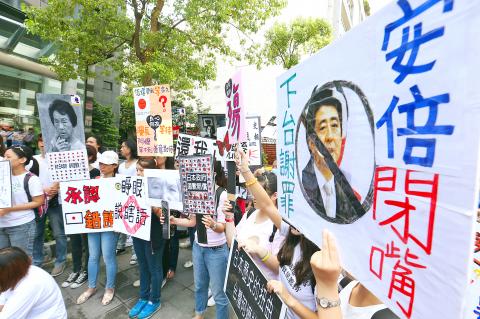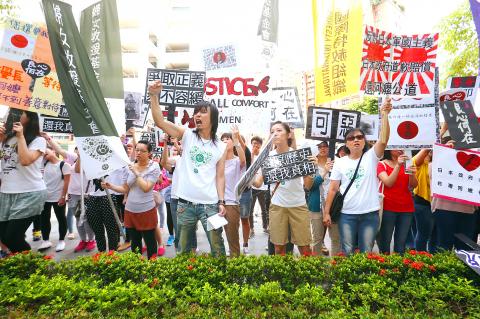On the eve of the 69th anniversary of Japan’s surrender in World War II, dozens of rights advocates yesterday demonstrated outside the Japanese representative office in Taipei, calling on Tokyo to formally apologize for forcing hundreds of thousands of women and girls to serve in military brothels during the war and to compensate them.
“The Japanese military forcibly recruited more than 1,000 Taiwanese women to serve as ‘comfort women’ in military brothels during World War II. Only five are still alive,” Taipei Women’s Rescue Foundation executive director Kang Shu-hua (康淑華) told the crowd outside the Interchange Association, Japan’s Taipei office.
“They are over 90 years old and their physical condition does not allow them to be here. Therefore, it is our obligation and responsibility to continue the struggle to fight for their rights,” Kang said.

Photo: CNA
Taiwan Women’s Link chairwoman Huang Sue-ying (黃淑英) echoed Kang’s appeal.
“The sorrow and the pain in the minds of the former comfort women have become part of our emotions. We will never stop our action to demand justice from Japan,” Huang said.
A Japanese official surnamed Murata took a petition from the demonstrators, promising to forward it to the Japanese government, and provide a response within one month.

Photo: CNA
“Comfort women” refers to women from Taiwan, Korea, China, the Philippines, Indonesia and elsewhere who were forced into military brothels to serve Japanese soldiers. The exact number of comfort women remains unknown, but most researchers agree that there were hundreds of thousands.
The foundation estimates that about 1,200 came from Taiwan.
Japan denies that the government or the Imperial Army forced women to work in brothels — with the latest investigation report, released in June, concluding that “it could not be confirmed that those women were forced into the service.”
However, in 1993, after hearing testimony from 16 South Korean women, Japan offered “sincere apologies and remorse” to the women, and vowed to face the historical facts squarely, in a statement released by then chief Cabinet secretary Yohei Kono.
The following year, Tokyo set up the privately funded Asian Women’s Fund to pay compensation to women in Taiwan, South Korea, the Philippines, Indonesia and the Netherlands, but many surviving comfort women refused to take the money because it did not come directly from the Japanese government.
“The comfort women issue is a global issue Japan should offer national-level apologies and compensations for the dignity of the former comfort women and their families,” Amnesty International Taiwan director Bo Tedards said.
Surviving comfort women and human rights groups in South Korea, the Philippines and several other nations also held rallies outside Japanese diplomatic posts yesterday.
There is an international campaign calling on the UN to make Aug. 14 a day to remember comfort women.

Alain Robert, known as the "French Spider-Man," praised Alex Honnold as exceptionally well-prepared after the US climber completed a free solo ascent of Taipei 101 yesterday. Robert said Honnold's ascent of the 508m-tall skyscraper in just more than one-and-a-half hours without using safety ropes or equipment was a remarkable achievement. "This is my life," he said in an interview conducted in French, adding that he liked the feeling of being "on the edge of danger." The 63-year-old Frenchman climbed Taipei 101 using ropes in December 2004, taking about four hours to reach the top. On a one-to-10 scale of difficulty, Robert said Taipei 101

Nipah virus infection is to be officially listed as a category 5 notifiable infectious disease in Taiwan in March, while clinical treatment guidelines are being formulated, the Centers for Disease Control (CDC) said yesterday. With Nipah infections being reported in other countries and considering its relatively high fatality rate, the centers on Jan. 16 announced that it would be listed as a notifiable infectious disease to bolster the nation’s systematic early warning system and increase public awareness, the CDC said. Bangladesh reported four fatal cases last year in separate districts, with three linked to raw date palm sap consumption, CDC Epidemic Intelligence

US climber Alex Honnold left Taiwan this morning a day after completing a free-solo ascent of Taipei 101, a feat that drew cheers from onlookers and gained widespread international attention. Honnold yesterday scaled the 101-story skyscraper without a rope or safety harness. The climb — the highest urban free-solo ascent ever attempted — took just more than 90 minutes and was streamed live on Netflix. It was covered by major international news outlets including CNN, the New York Times, the Guardian and the Wall Street Journal. As Honnold prepared to leave Taiwan today, he attracted a crowd when he and his wife, Sanni,

Taiwanese and US defense groups are collaborating to introduce deployable, semi-autonomous manufacturing systems for drones and components in a boost to the nation’s supply chain resilience. Taiwan’s G-Tech Optroelectronics Corp subsidiary GTOC and the US’ Aerkomm Inc on Friday announced an agreement with fellow US-based Firestorm Lab to adopt the latter’s xCell, a technology featuring 3D printers fitted in 6.1m container units. The systems enable aerial platforms and parts to be produced in high volumes from dispersed nodes capable of rapid redeployment, to minimize the risk of enemy strikes and to meet field requirements, they said. Firestorm chief technology officer Ian Muceus said